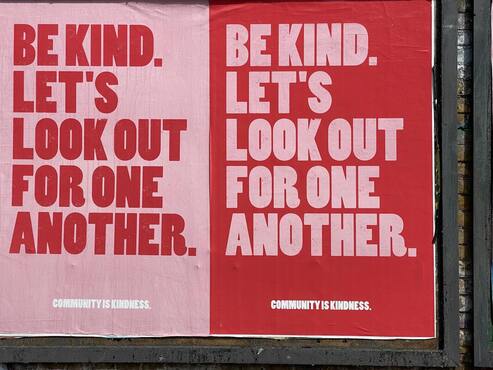|
By Caroline Tomlinson “I was excited. It was the day David was leaving for Finland…I took a test in the morning, and I told him later that day.” Emily and her husband, David, have two beautiful children and were excited to expand their family. Their youngest was just over 1 year old, and they felt like this was the perfect time to get pregnant again. You can imagine her excitement when two pink lines appeared on the pregnancy test. Everything was going well. Nothing was different than in her previous two pregnancies. But about 10 days after her positive test, Emily experienced severe migraines. The pain didn’t raise red flags, as this wasn’t abnormal for her. She had an ultrasound, and the technician assured her that everything was OK. But a few days later, she began experiencing more alarming signs of miscarriage. “I was bleeding a lot and could tell that was it.” Emily lost the baby. This baby is affectionately known in the household as Baby Finn, as Emily’s pregnancy took place during David’s trip to Finland. With each pregnancy, Emily was always cautiously excited because she knew miscarriage was a real possibility. Baby Finn was a beautiful reminder that life is precious and ultimately in God’s hands. Emily and David were fortunate to get pregnant a few months later and have since welcomed two more children into their family. Everyone’s experience is different. Although Emily’s loss wasn’t a physically traumatizing event, she still experienced pain in a different way. “I had a really hard time for at least a month, but I was never angry with God. The biggest thing was…where is my baby now? It was hard to talk to people about it because they would just be like, ‘oh of course your baby’s in heaven,’ but there’s no Bible verse that says that. That was really hard.” Miscarriage brings different pain for each mother. Emily said, “For me, it was not so much healing from the loss of my baby, as it was, can I trust God with the eternal destiny of my children?” Emily didn’t dwell on the loss of her baby. Instead, she wrestled with the hard, unanswerable questions of what happened to her baby. Was her baby in heaven? Will she meet it face-to-face one day? She didn’t know. The month following her miscarriage, her tears flowed as the question remained unanswered. Her husband supported her and encouraged her with scripture. She also received encouragement from her pastor and other mothers who had gone through miscarriages. The encouragement of others, verses in scripture, and the peace of the Lord helped Emily find rest in God’s sovereignty. Those who have not experienced the loss of miscarriage can learn from Emily’s experience. You never know how a mother is struggling with the loss of her baby. She, like Emily, may not be wrestling with anger toward God for taking her baby away. The pain may be different, and that’s OK. Emily also offered another perspective into how she’s doing, years later. “It’s not hard for me anymore…now we talk about Baby Finn, and it’s a sweet part of our family. I feel like there needs to be an acceptance of that, too. I hope I would not be looked at as not caring about my baby, because I’ve been able to rest in that Baby Finn is with the Lord and a sweet part of our family. I wouldn’t want there to be guilt if you’re just OK.” The Early Pregnancy Loss Association seeks to walk alongside women in any stage of grief. For people like Emily, it may not be grief as much as it is unrest and uncertainty. The EPLA understands all women grieve differently, and their mission is to encourage women to speak freely about their loss and pain. Everyone experiences grief differently, and Emily has been able to rest in her belief that her baby is in heaven. Mothers should feel comfortable speaking freely about their miscarriage, whether that be grief resulting in anger or heartbreak leading to peace and rest. Everyone’s experience is different, and that’s perfectly OK. Caroline Tomlinson is a junior Professional Writing and Information Design major at Cedarville University
1 Comment
By Heather Heritage M.A. The first trimester of my 4th pregnancy was rough. Not only was I exhausted with two young children and working full time, I had severe nausea and dehydration problems - so severe I ended up in the ER on more than one occasion. Most of the questions the ER staff askedwere perfunctory, trying to piece together my condition and background information to get a clear picture for treatment. But when a young physician’s assistant commented on my gestational and pregnancy history, imagine my shock when she bluntly stated, “oh, I see you had an abortion last year.” I had a miscarriage six months prior to that ER visit, and I knew that medical terminology technically classifies any pregnancy loss as an abortion of some sort. But knowing this didn't really take the sting out of her unempathetic words. In the end, I got the fluids I needed and went on my way, but couldn't shake the annoyance of the term “abortion” that was used to describe my miscarriage. Using the word abortion when referencing a miscarriage can be hurtful and alienate the very patients a health care provider (HCP) is trying to build rapport with and treat, even if it is “proper” medical terminology. In the area of early pregnancy loss (miscarriage), there are large inconsistencies in how providers communicate to mothers about the loss they are experiencing, which can result in a lack of thorough treatment and care for these vulnerable patients. A 2019 study explored early pregnancy loss and gaps in the physical, cognitive, and emotional treatment of patients. Using those criteria as a framework, I offer considerations in a triangle of treatment plan for health care providers to use with their patients who go through pregnancy loss. Physical Care The first, and most pertinent point in the triangle, is caring for the physical needs of a patient. In 2019, the American Pregnancy Association reported that one in five women with recognized pregnancies end in miscarriage, making it a fairly common experience. Because of their often abrupt and sudden nature, many women seek help at the emergency room. However, there are significant gaps of care for patients, specifically in the ER, regarding communication, diagnostic testing and follow up instruction. Delays in or failure to complete diagnostic tests occur, specifically with blood work and ultrasounds. In many situations, mothers have left a treatment center without knowing if they had lost their baby, what to expect, and without full comprehension of their condition. Even if the tests are completed, often there are long wait times for results – which could mean leaving a patient for hours, worrying and stressing that their pregnancy is ending. Much of these wait times are due to logistical barriers; however, those delays or obstructions should be communicated and clarified to the patient. There is another gap in treatment: scheduling follow-up visits, which are important for incomplete miscarriages, and cognitive and emotional healing. Often these follow-ups are never discussed or mentioned with a patient. Tips for health care providers caring for the physical point in the triangle of treatment include:
Cognitive Care The second point in the triangle of treatment focuses on cognitive care; specifically, using common terminology, and being able to explain what is happening and give thorough information. There is a need for common language when it comes to early pregnancy loss. Early pregnancy loss means any fetal loss at or before 13 weeks of gestation. This is also referred to as: miscarriage, fetal death, perinatal loss, spontaneous abortion, missed abortion, etc. HCPs need to understand that language and terminology have different meanings to different people, and HCPs need to be aware of this when communicating with their patients. A good tip in getting the terminology right is to use mirroring terms. For example, if a patient uses the term “baby” or “child,” an HCP should mirror their language by referring to the loss in matching terms. Patients also need more in‐depth explanation and communication on the causes of miscarriage, frequency of miscarriage, and their diagnostic test results. HCPs would do well to remember that this is a painful and emotional process for the patient. If a patient is being told the pregnancy is over; all of the hopes and dreams for a viable baby come to a glaring and final halt in that moment. They deserve explanation and information, both in verbal and written communication. Patients and their personal caretakers have said they want more information about physical complications, current treatment, resumption of menstruation, future pregnancies, and emotional health and healing. Tips for HCPs in the cognitive point in the triangle of treatment include:
Emotional Care The third point in the triangle of treatment stresses emotional care for miscarrying patients. There are many opportunities for HCPs to communicate with empathy and offer comfort in bereavement support. Mothers are experiencing shock, sadness, worry, guilt, helplessness, and yet often, there is little empathy provided. In addition, in an ER, there is little privacy, space, and time to process the diagnosis or for providers to simply listen to a patient. More could be done in allowing for the opportunity for mothers to express their grief and emotions. Tips for HCPs in the emotional point in the triangle of treatment include: 1. Encourage patient to talk and discuss their feelings. Give comfort specifically to alleviate feelings of guilt. 2. Encourage sharing of their experience when they are ready. Recommend social groups, websites, blogs, alternative therapies like poetry/art, etc. as it helps in the grieving process. 3. Encourage patients to read prominent stories of women in the public eye who have had a common experience, for example, Chrissy Teigen or Meghan, The Duchess of Sussex. This helps normalize the experience, and patients can find hope in common loss. 4. Understand, practice, and deliver bereavement support in the form of companion care. Dr. Wolfelt, Founder and Director of the Center for Loss and Life Transition defines companion care as:
5. For providers in managerial roles: Consider the use of doulas who specialize in pregnancy loss. A doula is a non-medical person who supports a woman during labor and birth, pregnancy loss, bereavement, and postpartum healing, and are trained to provide one-on-one care, physical comfort, companion care and emotional support. There is often funding via grants or programs that can bring doula care into a treatment center. Caring for the Whole Person Early pregnancy loss is a highly emotional and nuanced situation for each individual. Health care providers are inconsistent in how they communicate to and support mothers going through this sorrow. Understanding these implications would help them treat their patients more effectively, using a triangle of treatment to meet the physical, cognitive and emotional needs of these patients. We’ve all been in highly emotional situations and know that compassion and empathy can go a long way in humanizing the situation. HCPs who implement these suggestions could have a positive impact on grieving mothers for years to come. Heather Heritage is an Assistant Professor of Communication at Cedarville University.
By Emily Carrington EPLA President and Founder It was late afternoon on a Saturday or Sunday. It was early March, and we lived in Texas at the time. Looking at today’s date, it was probably about seven years ago, give or take a few days. I was starting to make a grocery list and thinking about what we would have for dinner that night. Suddenly I had the urge to take a pregnancy test - because you know, if I was pregnant, I should be focusing on all the good foods and avoiding all the bad foods. (You were my first pregnancy, and there was so much I didn’t know. I certainly didn’t know that by my 5th pregnancy I would be sharing slightly germy/slobbery McDonald’s fries with your sister Abigail and call it a win because I kept some food down! With you the standards started high). Minutes later, I knew you were there! You were inside of me. My first baby. Suddenly I was overwhelmed with all the things I didn’t know. What ARE good pregnancy foods? What about bad foods? How do I take care of this child? I told your dad about you, and he was thrilled! We were so ready for you. We were so glad you existed. We decided on Chipotle because I could load up on some good protein and veggies. That was one of the last decent meals I ate. For a while, only daddy and I knew about you. I remember going to a dinner party with friends and thinking about you the whole time.Every time I passed on the wine or the champagne, I thought about you. During church I nibbled on Saltines, and the woman who sat in front of us figured out you were in there. But most people never picked up on the clues. We were going to keep you a secret for two more months, but we just couldn’t wait anymore. We really wanted to tell your grandparents and your aunts and uncles you were in there. We went to Toys R Us and tried to come up with a cute way to tell everyone about you. We bought the book “Are You My Mother?” and a cute little onesie. We added a piece of paper to the title so it read “Are You My Grandmother?” We then took a picture of the book with the onesie and sent it on to our parents. Then we waited in excited silence for their reply. Grandma and Grandpa were the first to respond. They called confused and unsure what the text meant. I think we woke them up in the middle of a Sunday afternoon nap. When they figured it out, they were so excited! Your Nana and Pop Pop were so excited, too! A few days later we found out your cousin Tucker was on the way. Everyone was so excited you were here, with us. Sadly, we never got to name you. We didn’t know yet if you were an Abigail or a David. It turns out you were neither. We called you Baby and we still call you Baby, because that is the name we knew you by. Your life was so short, and it is often clouded over with grief. But I want you to know I do remember the good stuff, I think of you with so much fondness and joy. I know you were here with us. I know you were real. And I know you are worth celebrating. Emily Carrington is a freelance writer, wife, mother, and founder of the EPLA.
By: Kathryn Wales
Losing my daughter at 16 weeks gestation was a time of both personal breakdown and communal buildup. I could not have anticipated how much my friendships would grow in the torn soil of my soul, or how much my marriage could prosper thereafter. Miscarriage was not talked about much in my social circle until it happened to me, partly because mine came after we had announced the pregnancy publicly and because I was eager to talk in order to process it. Within the span of the following year, 11 of my friends would miscarry, and several of their babies now lie beside mine in a plot tucked inside Notre Dame’s cemetery. Together—without resources or scripts beyond instinct, desire, and hope—we developed a way of grieving such a unique loss. We laid our tiny children to rest in the earth and marked their spots with stone as if we had seen them grow up and had not just felt it; as if we had heard their voices and could remember their smell; as if their names could conjure entire personalities. We did what people have always done for their dead and were immensely blessed to be able to do so. Whenever I visit Theodora’s grave, I see those other surnames and think about those dear parents—our true friends who wept with us, prayed with us, made meals for us, and received all this back in their turn. I send photos of the graves to those who live too far away to visit as often as they wish, and ask how they are faring. They know I mean it in a deeper sense, from our place of shared trauma. And even when there is not world enough and time to reconnect with each other, this special kind of care helps us to reconnect with ourselves. We look at the scar that has become part of our identity. Together, we remember those members of our families who wait for us on the other side. Those particular witnesses are not part of my regular life anymore, save one: my husband. He and I grieved differently in the immediate aftermath and struggled to understand each another’s pain and process. I was desperate to see my own parents, feeling I had to care for them, while he delayed our journey because he could not leave without oiling the wooden wardrobe. Unable to care for our daughter, each of us wanted to care for someone, for something vulnerable. Then we did what we were advised not to do and conceived again as soon as possible, pushing a necessary period of shared mourning far into the future. It was not until another, much later personal crisis in which I called upon my daughter for help did I realize just how much my husband is part of my very self and I can do nothing, signify nothing, without him. Our children are acts of love made flesh, and every act of unlove dishonors their very existence. That is the meaning of marriage. That is family. Rebuilding in the light of that hard won wisdom is the brightest way of being. I recently returned to thank her for the goodness that my husband and I enjoy in this new season of life. I saw my friends’ names and wished them the same new intimacy. The heart is certainly fuller for having loved and lost and loved again. |
Archives
December 2023
Categories
All
|





 RSS Feed
RSS Feed